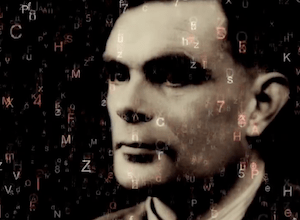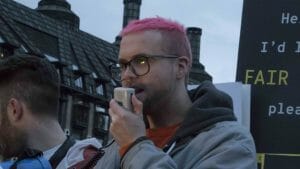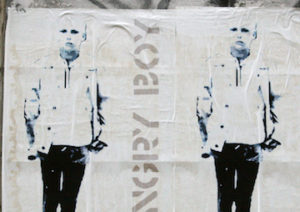Truthdigger of the Week: Alan Turing
One of the world's earliest computer geniuses, a British man whose work helped save humanity from fascism, was persecuted to death by the homophobic authorities of his era This Christmas Eve, thanks to popular pressure and the authority of Queen Elizabeth II, justice to his memory has been served in the form of a royal pardon.
Every week the Truthdig editorial staff selects a Truthdigger of the Week, a group or person worthy of recognition for speaking truth to power, breaking the story or blowing the whistle. It is not a lifetime achievement award. Rather, we’re looking for newsmakers whose actions in a given week are worth celebrating. Nominate our next Truthdigger here.One of the world’s earliest computer geniuses, a British man whose work helped save humanity from fascism, was persecuted to death by the homophobic authorities of his era. This Christmas Eve, thanks to popular pressure and the authority of Queen Elizabeth II, justice to his memory and legacy has been served in the form of a royal pardon.
Before it became one of the world’s most feared and despised institutions, the signals wing of the British intelligence service chiefly intercepted and decoded secret Axis communications during the Second World War. Its work began Sept. 4, 1939, the day after the U.K. declared war on Germany, when 27-year-old Princeton mathematician Alan Turing reported to Bletchley Park, the wartime station of the Government Code and Cypher School. Turing set to work creating the mathematical means to decrypt messages exchanged by the German military via what was known as the Enigma machine. Historians estimate the development of the Turing-Welchman bombe saved as many as hundreds of thousands of Allied lives and sped up the war’s end by up to two years.
Turing’s ultra-rare genius enabled him to become one of humanity’s true heroes. Like Bach at the harpsichord or Melville with language, his gift for mathematics led him not only to effortlessly understand Einstein’s Theory of Relativity at age 15, but to condense the work into a Cliff’s Notes style reader for his mother. By age 22, he had created the theoretical basis for the modern computer, and within a few years, experts say, demonstrated that the existence of certain insoluble problems in mathematics meant that complete and perfect knowledge of the universe could never be attained. As a reader at the University of Manchester after the war, Turing laid the foundation for artificial intelligence, and in the early 1950s made significant contributions to mathematical biology, the discipline that allows us to calculate, anticipate and intervene in the course of biological processes.
British officials repaid these and Turing’s other contributions with a criminal conviction. In January 1952, Turing admitted to having a sexual relationship with a man. The confession brought a charge of “gross indecency.” Turing met the unemployed 19-year-old Arnold Murray just before Christmas outside a Manchester theater. A few weeks into their relationship, Turing’s home was robbed. Murray told Turing he knew the man responsible, and in the course of reporting the crime to the police, Turing revealed that he and Murray were sexually involved. (Turing’s friends described him as being committed to truth and clarity as a matter of constitution, no matter the circumstance.) Homosexual acts were criminal in Britain at the time and would remain so until 1967.
Rather than spend years in prison, Turing took an offer of probation on the condition that he undergo a year of hormone treatment. The procedure, which involved injections with synthetic estrogen, amounted to castration. His body became deformed. Impotency set in. He grew breasts. Additionally, a series of questions as to whether he could guarantee he would never reveal secrets of his intelligence work to lovers — a concern inflamed by knowledge that two recently discovered Soviet double agents associated with Cambridge were gay — led to the stripping of his security clearance and his debarment from further work with the GCHQ, Britain’s intelligence agency. Under constant surveillance by authorities, Turing’s privacy evaporated.
In the summer of 1954 Turing’s housekeeper found him dead. The autopsy determined the cause to be cyanide poisoning, and an inquest ruled the death a suicide. Whether Turing killed himself is a matter of some debate. Acquaintances and colleagues described him as careless. Some speculate he inhaled the toxin while performing experiments in one of his tiny spare rooms. Others looked to the apple he habitually ate before bed. The half-eaten fruit that was discovered next to his body was never tested for cyanide, but Turing’s love of the “Snow White” tale continues to give some people a romantic way to imagine his end. He was 41 years old.
Though he was awarded the title Order of the British Empire by King George VI for his wartime services, his involvement in cracking the Enigma code remained an official secret for many years. Remorse over his tragic end struck the public conscience when his role became known. Fury within Britain grew to a boil in 2009 when Prime Minister Gordon Brown made an “unequivocal apology” for the Justice Ministry’s actions. Efforts to gain Turing an official pardon paid off this Christmas Eve when, after the Ministry of Justice refused to pardon Turing, Queen Elizabeth II did so herself under the Royal Prerogative of Mercy. The queen has issued only four such pardons since the beginning of her reign in 1953, the year after Turing’s conviction. Gay and human rights advocates and others cheered the announcement, but many wonder whether the approximately 75,000 men who were convicted of the offense — some 16,000 of whom are still alive — will be similarly absolved of wrongdoing.It is impossible to miss the similarities between the course of Turing’s life and the persecution of whistle-blowers in our age. For publishing accounts of government and corporate wrongdoing produced by the offenders themselves, WikiLeaks founder Julian Assange on Sunday entered his 558th day of confinement in London’s Ecuadorean Embassy. For retrieving some of those records, hacker Jeremy Hammond on Sunday entered his 664th day in prison. Though he is being pursued by the U.S. government, NSA whistle-blower Edward Snowden, the man who in June gave us irrefutable proof of both the NSA and the GCHQ’s unconstitutional domestic spying, is exiled in Russia. And just a few months ago, Chelsea Manning, WikiLeaks’ most famous and consequential source, was sentenced to 35 years.
All of these people have been hounded and terrorized by governments for their deep, personal commitments to the truth. Though it is early for the others, history has so far vindicated only one of them, and it did so at a time of intensifying public pressure to grant homosexuals — a scapegoated minority because of the convenient opportunity it has often offered unscrupulous demagogues to accumulate popular power — the human rights they deserve. Power admirably pardoned Alan Turing, but it did so when it would have been more dangerous not to. It has so far not chosen to honor the integrity of others who bore tremendous risks to serve their countries rather than the leaders who govern them.
Below are three films. The first and third are brief documentaries on Turing’s contributions to mathematics and science and his conviction and death. The second is the full-length 1996 BBC dramatization of Turing’s life, starring the much-beloved English actor Derek Jacobi, who, like Turing, is gay. In one of the play’s final scenes, Turing’s character is asked by Patricia Green, his friend, fellow analyst and frustrated admirer, why he didn’t marry her and enjoy the social protection that so many homosexuals have sought when faced with a life of relentless suspicion and discrimination.
“None of this ever would have happened. I should have played the game and stuck to the rules,” Turing tells Green. She asks, “Why didn’t you?” He responds, “I couldn’t.”
For playing indispensable roles in saving humanity from fascism, advancing scientific knowledge into new territories and suffering the terminal injustice of fraudulent and cowardly inferiors, we honor Alan Turing as our Truthdigger of the Week.
Cambridge University:
Ciencias Cognoscitivas:
mishima1970:
Your support matters…Independent journalism is under threat and overshadowed by heavily funded mainstream media.
You can help level the playing field. Become a member.
Your tax-deductible contribution keeps us digging beneath the headlines to give you thought-provoking, investigative reporting and analysis that unearths what's really happening- without compromise.
Give today to support our courageous, independent journalists.








